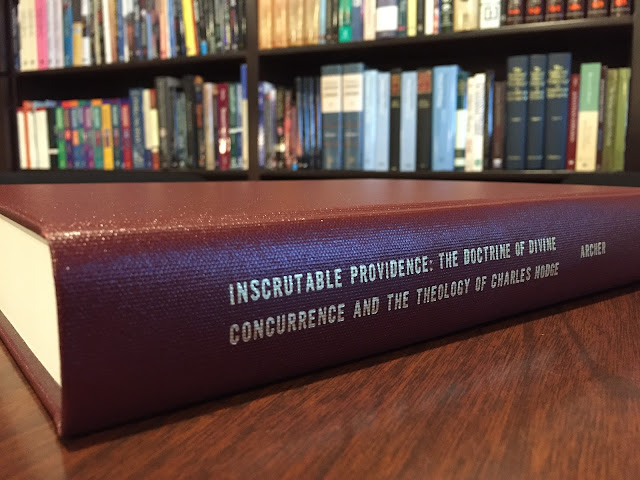But in the meantime, for anyone who might have been wondering what my dissertation was about, here is a copy of the official abstract (i.e., summary). It isn't exactly light reading, but for those who are inclined... enjoy!
INSCRUTABLE PROVIDENCE:THE DOCTRINE OF DIVINE CONCURRENCE AND THE THEOLOGY OF CHARLES HODGE
ABSTRACTThis dissertation will discuss the doctrine of concurrence within the larger doctrine of providence. Although concurrence was once a key component of the doctrine of providence, it was difficult to maintain in a post-enlightenment theological and philosophical context, even for a Reformed thinker such as Charles Hodge. Although Hodge labored to explain the older formulation of this doctrine—especially as articulated by Francis Turretin—Hodge found concurrence problematic and did not commend its use. In addition to shifting philosophical sensibilities, concerns regarding pantheism were a significant reason why some nineteenth-century American Calvinists distanced themselves from concurrence. Nonetheless, Hodge’s theology stands largely in continuity with Turretin and the echo of this doctrine continues in his theological system. For Hodge, the concept of the “efficient presence of God” functionally stands in the gap left by the absence of concurrence. Hodge sought to articulate a system of providence that affirmed God’s exhaustive sovereignty but avoided fatalism or mechanical theories of necessity. As with Turretin, Hodge did not believe that contingency—correctly understood—was antithetical to the Reformed understanding of the sovereignty of God. Within the order of second causes there may be events that are not necessarily determined by other causes within that order. For Turretin, the doctrine of concurrence is what allowed contingency to be possible without violating the principle of sufficient reason.Despite the difficulties involved with this doctrine, this dissertation will demonstrate that concurrence—or Hodge’s similar concept of the efficient presence of God— remains valuable for constructing a healthy model of providence. Concurrence allows us to affirm the reality of secondary causes (thus avoiding pantheistic errors) without reducing everything to secondary causes (thus avoiding deistic errors). Although we should acknowledge Hodge’s critique of concurrence, when properly understood the benefits of concurrence outweigh its problems. Concurrence fits with the Biblical witness and allows us to credit God for acts of ordinary providence. In addition, concurrence can be understood according to an author-story model utilizing the scholastic distinction between God’s scientia necessaria and scientia voluntaria. Rather than multiplying difficulties without benefit, the doctrine of concurrence remains valuable and should be retained.



No comments:
Post a Comment